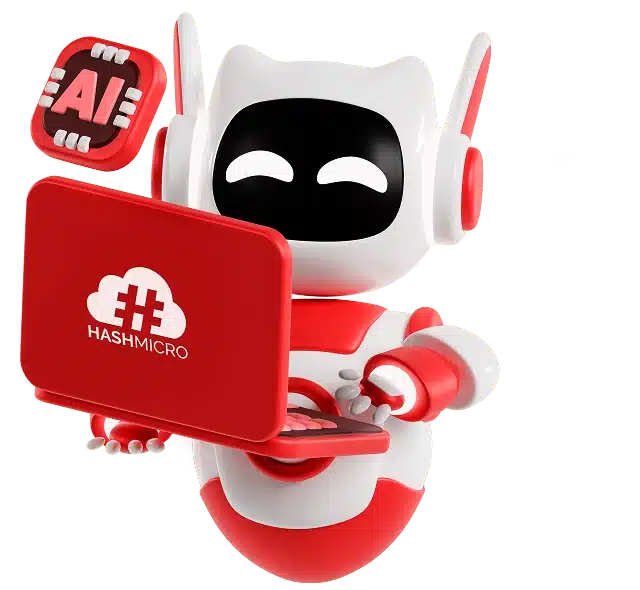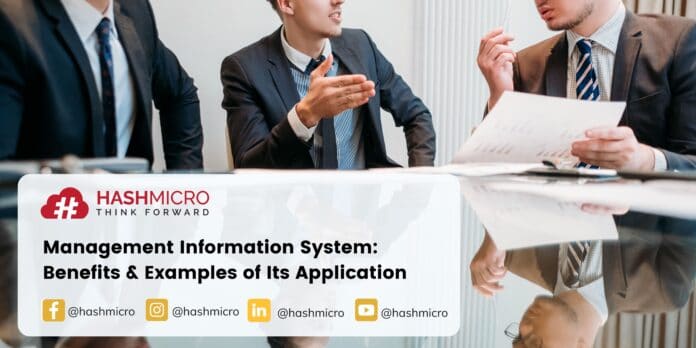Technological advancements require robust Management Information Systems and Enterprise Resource Planning systems to manage data efficiently. A cloud-based Enterprise Resource Planning system can streamline processes, improving business operations and decision-making.
HashMicro’s ERP system automates tracking, enhances efficiency, and ensures real-time accuracy across all business functions. Ready to optimize your business management?
This article explores how ERP software can help automate your processes and boost business performance.

Table of Content
What is MIS or Management Information System?

A management information system (MIS) is a series or group of processes that process, analyse, and display data to be used in decision-making. This system is a planning system that is part of the company’s internal control and consists of documents, human resources, technology, and management accounting processes. It is similar to how you can plan, schedule and analyze all aspects of your Instagram account using some Instagram growth tools.
The primary goal of this system is to collect and organize all data from various levels of business, and summaries, and then facilitate decision-making, and improve quality to increase the company’s productivity and profitability.
Furthermore, there are a variety of expert opinions on the meaning of MIS, including:
L. Jamers Havery
A management information system or MIS is a logical and rational process for executing or designing a series of interrelated components.
Azhar Susanto
A management Information System is a set or group of subsystems or parts or components of various types, physical or non-physical, interconnected for control, evaluation, and continuous improvement.
Ludwig von Batalanfy
A management information system is a set of interrelated elements in a relationship between these elements with the environment.
So far, are you interested in knowing more about management information systems? Then, check out the benefits and applications of SIM for the following business.
Hashy AI Fact

Need to Know
Similar to how MIS supports decision-making with organised data, AI ERP streamline business operations with real-time insights and smart automation.
Request a free demo today!
Also read: The Usage of Fingerprint | Biometric Technology as the Employee Attendance System
Four Benefits of a Management Information System
Here are some of the advantages or benefits of using an MIS for management and a company as a whole.
1. Improving data accuracy
Accurate data is needed in a company because it is related to strategic decisions. MIS is a tool that provides accurate data needed by the company.
The system automatically processes incoming data to make administrative tasks more effective and efficient. And with the support of internet technology, you can also retrieve the required data in the system in real-time. To enhance data accuracy, ensuring devices like iPhones are properly configured is crucial. Setting a static IP address on an iPhone can maintain a stable network connection, reducing connectivity issues that may lead to data discrepancies. This helps facilitate real-time data retrieval from the MIS, streamlining administrative tasks and supporting better strategic decision-making.
2. Facilitate coordination
This system also provides information services that you can use for planning, monitoring, and administrative control. From the resulting information, data can be used by other departments or departments in need.
Information systems also help management to delegate tasks to other parties easily. Coordination between departments can also take place quickly without having to meet in person.
3. Improving the quality of human resources
What is a management information system for executives? Of course, when information data is available accurately and quickly, this will affect the performance of the company’s human resources. Like it or not, HR who use this system must adapt their work system to technological advances. Quality resources will undoubtedly affect the progress of your business development in the future. Use the help only of your trusted HR software.
4. Reduce operational costs
If MIS has worked for your company, this system will help minimize human error. With a minimal number of errors, the productivity of existing human resources will also increase. Then at the same time, conditions like this certainly reduce the company’s operational costs.
Also read: Production Process in Business: Definition, Types, and Characteristics
Disadvantages of not implementing information systems in business
The following are the disadvantages of not having a business information system:
- Piracy and cybercrime are typical examples of technological crimes.
- Individual liberty and competence do not grow.
- Due to a lack of progress in IT, does not strengthen the economy.
- Media offers will present a limited range of interests and tastes.
- The formation of community ties and relationships will be hampered.
- An agency’s operations become inefficient.
Also read: 6 Ways to Optimize Business Using Cloud ERP Singapore
Application of Management Information Systems in Business
1. Enterprise Resource Planning (ERP)
Usually, large companies often use reliable ERP management information systems. However, this system can also be used on a small scale. ERP is generally used in management and in integrated monitoring between business units.
2. Supply Chain Management (SCM)
This system is beneficial for management because it can help to integrate material supply management from suppliers, manufacturers, and retailers to final consumers.
3. Transaction Processing System (TPS)
TPS is a management information valuable system for processing large amounts of data or multiple and routine transactions.
This program is widely used in payroll and inventory management.
4. Office Automation System (OAS)
This application helps facilitate communication between departments within a company by integrating computer servers for each company user.
For example, the use of email for various activities in the office every day.
Also read: How to Calculate Your Employee Year-End Bonus
5. Knowledge Work System (KWS)
This system integrates new knowledge into an entity or organization/unit. i.
6. Informatic Management System (IMS)
IMS helps support various tasks within the organization and analyses decision-making. This system can also integrate various information functions with computer programs such as electronic shopping…
7. Decision Support System (DSS)
This system helps executives make decisions by observing the business environment. An example of this single management information system is links electronic.
8. Expert System (ES) and Artificial Intelligent (AI)
Both systems use artificial intelligence, which helps analyze a problem using expert energy knowledge.
9. Group Decision Support System (GDSS)
If the previous system was to analyze problems, this system is to find solutions to a problem through gathering knowledge in a group, not per individual. Usually in the form of questionnaires, consultations, and scenarios. Examples such as e-government.
10. Computer-Support Collaborative Work System (CSCWS)
This system is a group of users who design a system to help them work as a group and understand the impact of technology on their work patterns.
11. Executive Support System (ESS)
This system helps managers to interact with the corporate environment through graphics and other communication tools.
Related article: Benefits of Using a Cloud SCM
Conclusion
Management information systems provide several advantages and functions that are especially useful in business. As a result, this system can make work and decision-making more effective and efficient. However, reliable personnel must support the management information system, and involvement in the system’s design is required.
ERP in MIS is one such system that can assist in streamlining business operations by automating the most data-driven processes, performing extensive data analysis, as well as providing accurate data management, all within an intuitive and integrated framework.
ERP can simplify complex business activities, increasing efficiency, saving costs and optimizing your company’s productivity. Different scale companies can use this software, be it small, medium, or large.
In short, If you still don’t know which module you need in an integrated ERP system, don’t hesitate to ask the right ERP solution provider. HashMicro offers a free consultation for those who are planning to implement ERP in their company.
Don’t wait – Test the free demo now and explore!



































